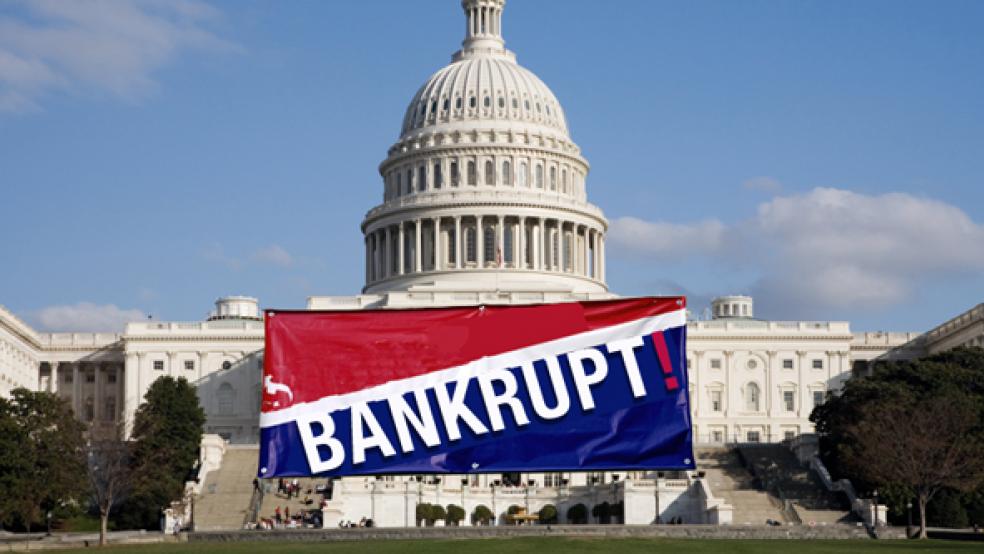Federal budget deficits should shrink for the next few years, but then take off as the national debt becomes worse and worse.
This is the major takeaway from the new economic forecast released Tuesday by the Congressional Budget Office. It’s the first batch of fresh projections since President Obama and Congress agreed last month to a fiscal cliff deal that raised taxes on the top 1 percent of Americans by more than $600 billion over the next decade. And the CBO numbers suggest that the past two years of deficit haggling, which also produced more than $2 trillion in spending cuts, did little to alter the path of government finances over the next decade.
Obama will likely have his first year without a trillion dollar-plus deficit in 2013. The CBO forecasts that it will slip to $845 billion this year and then drop down to $476 billion by 2016, Obama’s last full year in the White House. This is largely due to the recovery from the 2008 financial crisis finally taking hold, as growth begins to accelerate almost five years into the rebound.
But 2016 is also a major inflection point for the government. After that point, the deficits begin to surge despite an unemployment rate that the CBO projects will be heading south of 5.5 percent. This is when retiring baby boomers start to drain federal coffers and the years of accumulated deficits take their toll.
“Deficits are projected to increase later in the coming decade, however, because of the pressures of an aging population, rising health care costs, an expansion of federal subsidies for health insurance, and growing interest payments on federal debt,” the CBO wrote.
The CBO predicts the annual deficit would be $978 billion in 2023. As a share of the economy, the deficit would be much smaller than its current levels. But then there is the national debt, the sum of all those yearly deficits. Publicly held debt, not counting what the government controls, would be 77 percent of the Gross Domestic Product, up from the 76.3 percent projected for this year. To put that in context, the national debt averaged 39 percent of GDP since 1973.
At the current trajectory, the debt would only compound as the post-World War II generation aged into retirement and collecting their federal entitlements. The stark CBO numbers present a choice at the heart of the political divide between Republicans and Democrats.
House Budget Committee Chairman Paul Ryan, R-Wisc., sees no choice but to trim entitlement expenditures for future generations.
“The CBO’s report is yet another warning that we need to get spending under control,” Ryan said. “This isn’t a partisan issue. It’s math. Unless the president and the Senate offer a credible plan to close the deficit, we will have a debt crisis—and the country will suffer.”
The problem is demographic, rather than partisan, but the proposed solutions are ideological and political. Republicans such as Ryan believe that entitlement programs can be revamped into programs that lean more heavily on consumer choice to control costs, whereas Obama and his allies counter that the approach only shifts more expenses onto older Americans with fixed incomes. They say additional tax increases must be part of the mix, because the supplemental income and health insurance benefits are needed by retired, middle class Americans.
“CBO’s real world budget outlook has improved in large part because we ended bonus tax breaks for the very wealthy and used that revenue to reduce the deficit,” said Chris Van Hollen, D-Md., ranking member of the House Budget Committee. “This supports the need to follow the president’s measured and balanced approach as we move forward to address the sequester and further reduce our deficit.”
But both parties have tried to delay the inevitable day of reckoning. Congress has perpetually blocked the 25 percent reduction in Medicare payments for doctors, and Obama on Tuesday asked Congress to pursue an alternative to sequestration cuts set to begin in March—slightly more than half of the $2.1 trillion worth of reductions agreed to in 2011.
Tucked in the middle of the CBO report is a warning about delays to the Medicare payments and automatic spending reductions. Without them, the national debt would instead rise to 87 percent of GDP.




